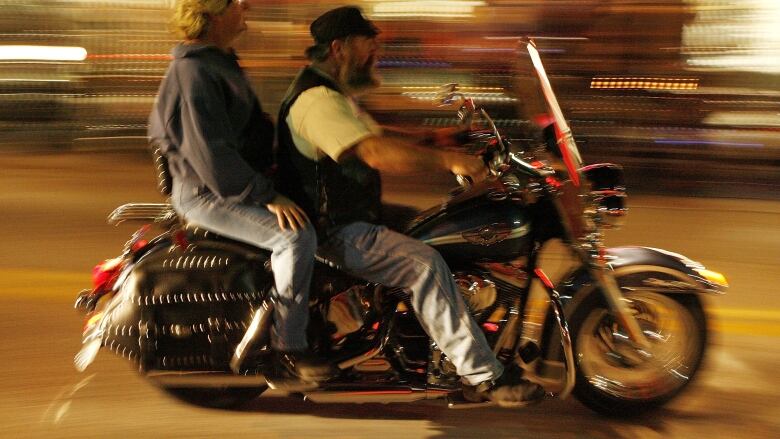Motorcycle-related deaths more common during full moon, study finds
Effect is even greater during a supermoon and in rural areas, U of T-Princeton report shows

Motorcyclists should take extra care the next time they're out for a drive at night during a full moon.
A new study in the Christmas issue of the BMJ suggests that a full moon is associated with an increased risk of fatal motorcycle crashes.
Analyzing 1975-2014 data from the official U.S. registry of motor vehicle crashes, researchers from Princeton University and the University of Toronto calculated the number of fatal motorcycle crashes on full moon nights compared with the control nights without full moons.
They found an average of 9.1 motorcycle deaths at night when there was a full moon, compared with an average of 8.64 motorcycle deaths on nights without a full moon.
That's about a five per cent increase in relative risk, or about one additional death for every two nights with a full moon, for an absolute increase of 226 additional fatal crashes, said Donald Redelmeier, a professor of medicine at the University of Toronto and the study's lead author.
Redelmeier said he was surprised by the size of the effect the five per cent difference in risk which was bigger than the decreased risk from wearing reflective clothing and having daytime running lights on amotorcycle.
The researchers said that the average motorcyclist in the study was a 32-year-old man riding a motorcyclein a rural location who wasn`t wearing a helmet when hehada head-oncrash.
The researchers extended their analysisto three other countries, Australia, Canada and the United Kingdom,and found similar results. There are about 200 deaths each year in Canada, where there are an estimated 600,000 motorcyclists, Redelmeier said.
"Our study suggests that extra care is needed when riding a motorcycle under a full moon, and more broadly that the findings serve as a safety reminder to the hundreds of thousands of Canadians who ride motorcycles," he said.

Risk greater during supermoon
Redelmeier, who has a motorcycle rider's licence but hasn't ridden in more than a year, said"each one of those deaths could have been prevented by a small change in rider behaviour. Each one of those is a tragedy that did not have to happen."
Another finding that surprised the researcherswas that there was a 30 per cent relative increase in risk of a fatal motorcyclecrash under a supermoon when the full moon appears larger and brighter.Over the study period, there were 703 fatalities on the 65 supermoons that occurred, for an average of 10.82 deaths in the United States.
To avoid crashes, Redelmeiersaid riders should follow standard safety advice: maximize visibility, wear protective clothing and maintain the motorcycle in excellent condition. It's also recommended they wear a helmet, activate headlights, scan the road surface for defects, as well as ride in good weather conditions, watch for left-turning vehicles and forgo stunts.
Eye off the road
The researchers say they wanted to see if the full moon was a cause of motorcycle fatalities partly because they noticed it was used in advertising of cars, vacations and other consumer goods to attract people's attention.
"We thought that those same factors, although they may be completely innocuous in themarketplace, could actually cause a motorcyclist to take their eye off the road and contribute to a moment of inattention, a loss of control of the vehicle and irreparable consequences," Redelmeiersaid.
He noted that figuring out what distracted someone before a crash is normally difficult, because victims often get a concussion and can't remember what happened.
"It makes it impossible to learn from mistakes."
With files from Christine Birak












_(720p).jpg)


 OFFICIAL HD MUSIC VIDEO.jpg)
.jpg)



























































































